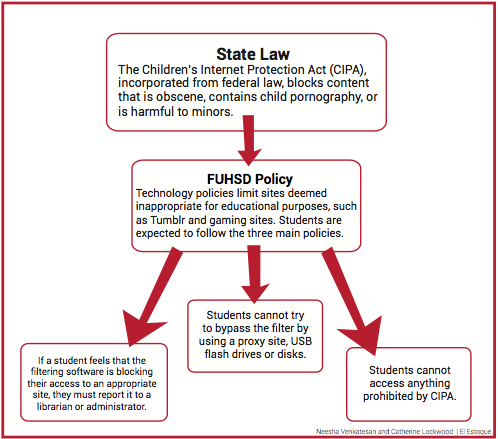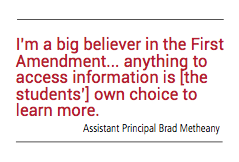 The requested page is currently available. Your organization has chosen to allow limited viewing of this site, due to the rating of its content.
The requested page is currently available. Your organization has chosen to allow limited viewing of this site, due to the rating of its content.
FUHSD has recently been changed their filters on their campus computers.
The new school year has called for new ways to incorporate technology and Internet on campus. The change was made possible partly because of the changes in district and statewide regulation of Internet use in education over the last year. According to Assistant Principal Brad Metheany, the district has allowed limited access to sites like YouTube since the beginning of the year, due to the teachers and administration trying to take advantage of their educational benefits. Along with these changes, the district has also allowed students more accessibility to sites on the Internet.
“I’m a big believer in the first amendment … anything to access information is [the students’] own choice to learn more,” Metheany said.
The electronic filters on campus are determined on a district level, meaning that MVHS shares school filtering systems with the other FUHSD schools. Metheany believes changes are made with the consideration of students first. He asserts that the FUHSD manager of technology, Scott Harrington, aims to protect students through the filters.
Harrington is part of the district technology team that maintains the filter. The policy decisions are made by the FUHSD Cabinet, which includes the Superintendent, Assistant Superintendent, Associate Superintendents and principals of individual schools in the district. Additionally, a district Technology Advisory Committee — comprised of teachers, administrators, site technology and district technology staff — is responsible for providing input to the Cabinet. This committee receives input from teachers and students and strives to balance their interests at all the school sites.
 Ultimately, however, the filtering policies are not completely set by the district. As part of the public education system, FUHSD receives funding from the state government and must abide by state and federal laws, such as the Children’s Internet Protection Act, which requires filters on the Internet usage in their schools. FUHSD specifically uses iPrism as their filtering software to make changes in their schools’ Internet use.
Ultimately, however, the filtering policies are not completely set by the district. As part of the public education system, FUHSD receives funding from the state government and must abide by state and federal laws, such as the Children’s Internet Protection Act, which requires filters on the Internet usage in their schools. FUHSD specifically uses iPrism as their filtering software to make changes in their schools’ Internet use.
The constant changes in Internet access have left students like junior Lilian Ngeow unaware of and confused about the filters at school. When told about the changes, she expressed belief that Internet flexibility could be increased further.
“I think we definitely need to have a filter to some degree but I don’t think [the administration] should filter every single thing because I know there’s some educational websites that are filtered and shouldn’t be,” Ngeow said. “I feel that [the recent YouTube filter] is kind of unnecessary because YouTube already takes out any videos that aren’t particularly appropriate.”
Harrington said that the district refines their filters based on the feedback they receive from each school’s staff and administration. Changes are made in the context of individual circumstances, such as teachers’ desire to stream videos in class to aid their teaching. In addition to abiding to CIPA, the district has its own technology policies to filter out websites that have no educational value, such as gaming sites.
The district’s experimentation with the Internet filtering system has not prevented others, like Assistant Principal Michael Hicks, from believing that Internet freedom has its place in education.
“Granted, [the students’ access] is controlled access, which I think is okay too because part of teaching students how to manage their time is giving them some guidelines and restrictions to work under,” Hicks said.
Hicks acknowledges the problems that might arise from granting students freedom to view more websites, such as viewing non-educational content or wasting time. However, he still sees greater access to websites as a necessary first step.
“There’s always going to be concerns, there’s always going to be issues. We just have to deal with them as they arrive, and hope students use some sort of common sense when they’re viewing things,” he said. “But I think the positives far outweigh the negatives, and you don’t want to shut off access just because it’s easier.”





